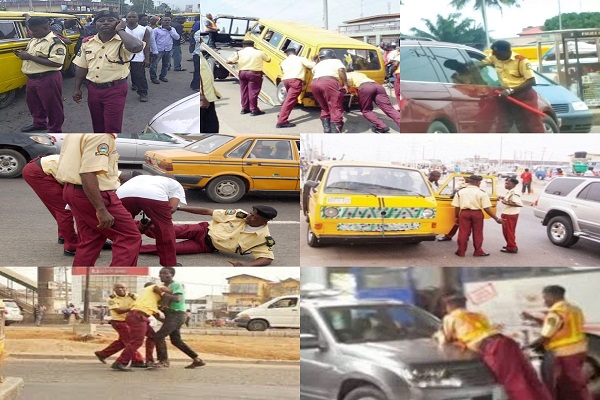
For the record, the Lagos State Traffic Management Authority (LASTMA) is an agency that is under the Ministry of Transportation.
The agency was established on July 15, 2000 by former Governor Bola Ahmed Tinubu to help maintain the level of sanity on Lagos major roads.
The mission of the agency is to promote a state-wide culture of traffic regulation, control, and management, as well as to ensure smooth traffic flow on Lagos road.
Since it was established, the agency has continued to arrest and fine road users found violating any of the road rules and regulations.
While some offences carry various fines, imprisonment and training at Lagos State Driving Institute, there are other major offences that provide for the seizure of the cars, trucks, motorcycles of traffic offenders.
Some offences which may lead to forfeiture of vehicles by offenders are: violation of routes by commercial vehicles, disobeying traffic control personnel, or neglecting traffic directions.
Here is a list of important rules to obey to avoid troubles with the officials of the agency:
1. Ensure your vehicle does not break down and obstruct traffic flow because this may lead to getting fined for obstruction and also paying the towing fee.
2. Avoid indiscriminate parking, dropping off or stopping to pick passengers on the highway.
3. Always display reflective warning signs at the point of breakdown on the road.
4. Drive your vehicle within restricted routes or dedicated lanes.
5. Do not disobey traffic lights.
6. Be civil and not disobey LASTMA officials.
7. Avoid one-way driving.
8. Ensure to keep to the right lane if your vehicle is moving slowly.
9. Avoid making wrong U-turns.
Remember that ignorance of the law is not an excuse.
There are two options for apprehended traffic offenders – payment of fine or accepting issuance of court referral. If the traffic offender signs an undertaking and agrees to pay a fine instead of appearing in court, then so be it.
On the other hand, if the traffic offender feels he is not guilty of an offence, then the court is on ground to hear his case.
Source: The Nation
The agency was established on July 15, 2000 by former Governor Bola Ahmed Tinubu to help maintain the level of sanity on Lagos major roads.
The mission of the agency is to promote a state-wide culture of traffic regulation, control, and management, as well as to ensure smooth traffic flow on Lagos road.
Since it was established, the agency has continued to arrest and fine road users found violating any of the road rules and regulations.
While some offences carry various fines, imprisonment and training at Lagos State Driving Institute, there are other major offences that provide for the seizure of the cars, trucks, motorcycles of traffic offenders.
Some offences which may lead to forfeiture of vehicles by offenders are: violation of routes by commercial vehicles, disobeying traffic control personnel, or neglecting traffic directions.
Here is a list of important rules to obey to avoid troubles with the officials of the agency:
1. Ensure your vehicle does not break down and obstruct traffic flow because this may lead to getting fined for obstruction and also paying the towing fee.
2. Avoid indiscriminate parking, dropping off or stopping to pick passengers on the highway.
3. Always display reflective warning signs at the point of breakdown on the road.
4. Drive your vehicle within restricted routes or dedicated lanes.
5. Do not disobey traffic lights.
6. Be civil and not disobey LASTMA officials.
7. Avoid one-way driving.
8. Ensure to keep to the right lane if your vehicle is moving slowly.
9. Avoid making wrong U-turns.
Remember that ignorance of the law is not an excuse.
There are two options for apprehended traffic offenders – payment of fine or accepting issuance of court referral. If the traffic offender signs an undertaking and agrees to pay a fine instead of appearing in court, then so be it.
On the other hand, if the traffic offender feels he is not guilty of an offence, then the court is on ground to hear his case.
Source: The Nation








No comments:
Post a Comment